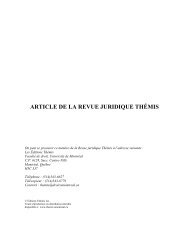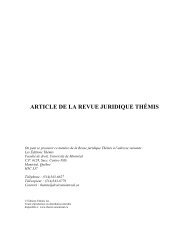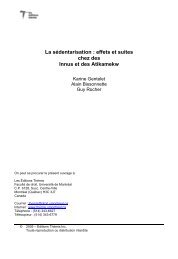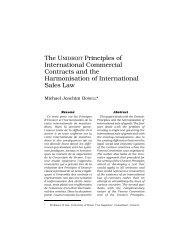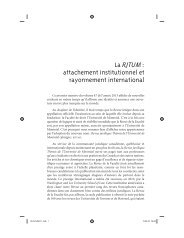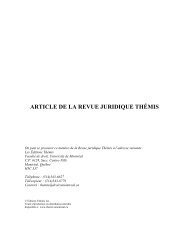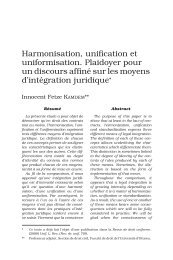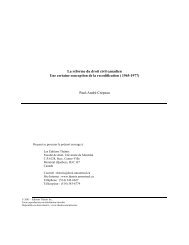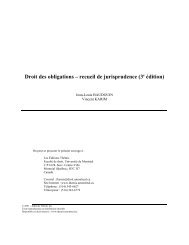The UNIDROIT Principles of International Commercial Contracts and ...
The UNIDROIT Principles of International Commercial Contracts and ...
The UNIDROIT Principles of International Commercial Contracts and ...
You also want an ePaper? Increase the reach of your titles
YUMPU automatically turns print PDFs into web optimized ePapers that Google loves.
THE <strong>UNIDROIT</strong> PRINCIPLES AND MERCOSUR COUNTRIES 381<br />
especially for those who in their daily work come across several<br />
national laws governing, <strong>of</strong>ten in a conflicting way, the multiple<br />
faces <strong>of</strong> an international contract. <strong>The</strong> <strong>Principles</strong> may also seduce<br />
judges <strong>and</strong> arbitrators who, faced with the application <strong>of</strong> the<br />
“generally accepted principles <strong>of</strong> international commercial law” t o<br />
a dispute, can now refer to a systemic body <strong>of</strong> contractual norm s<br />
that witness strong reputation <strong>and</strong> are easily identified in the<br />
international context.<br />
In free-trade <strong>and</strong> common market zones, such as the ME R C O S U R,<br />
the <strong>Principles</strong> can play a very important role in fostering <strong>and</strong><br />
deepening the goals <strong>of</strong> economic integration. <strong>The</strong> importance <strong>of</strong><br />
u n i f o rm contract law principles in an area which re p resents 50% <strong>of</strong><br />
Latin America’s GDP, a potential market <strong>of</strong> 210 million consumers,<br />
<strong>and</strong> experiences increasing internal <strong>and</strong> external trade figures, can<br />
hardly be fully stressed 6 .<br />
Though the <strong>Principles</strong> a re still scarcely known in the South Cone<br />
<strong>of</strong> the Americas, they bear the potential to become, among us, a<br />
p o w e rful instrument <strong>of</strong> voluntary harmonization <strong>of</strong> intern a t i o n a l<br />
contracts law, both in intra-ME R C O S U R transactions <strong>and</strong> in those<br />
p e rf o rmed between ME R C O S U R-domiciled parties with partners<br />
established in other countries. <strong>The</strong> use <strong>of</strong> uniform rules, specific a l l y<br />
c reated for transnational commercial transactions may as well allow<br />
the parties, judges <strong>and</strong> arbitrators to circumvent the rigidity<br />
resulting from the “localization” <strong>of</strong> international contracts within a<br />
given national legal system, keeping the respective disputes away<br />
6<br />
<strong>The</strong> ME R C O S U R is a process <strong>of</strong> economic integration among Argentina, Brazil,<br />
Paraguay <strong>and</strong> Uruguay established by the 1991 Treaty <strong>of</strong> Asuncíon,<br />
complemented by the 1994 Treaty <strong>of</strong> Ouro Pre t o. <strong>The</strong> ME R C O S U R countries’ global<br />
imports growth has averaged 20.5%, with total figures climbing to US $83,217<br />
billion (1996) from US $32,140 billion (1991). Intra-MERCOSUR imports growth<br />
has averaged 26.9%, with fig u res climbing to US $17,092 billion (1996) from US<br />
$5,125 (1991), while extra-MERCOSUR imports growth has averaged 18.9%, with<br />
figures climbing to US $66,125 billion (1996), from US $27,016 billion (1991).<br />
I n t r a -ME R C O S U R FOB exports have also grown by 334% to US $17,058 billion<br />
(1996), from US $5,102 billion (1991). For more on the economics <strong>of</strong> re g i o n a l<br />
integration in Latin America, see: R. D E V L I N <strong>and</strong> R. F F R E N C H - D AV I S, “To w a rd s<br />
an Evaluation <strong>of</strong> Regional Integration in Latin America in the 1990s”, (1999) 22<br />
<strong>The</strong> World Economy 261.



